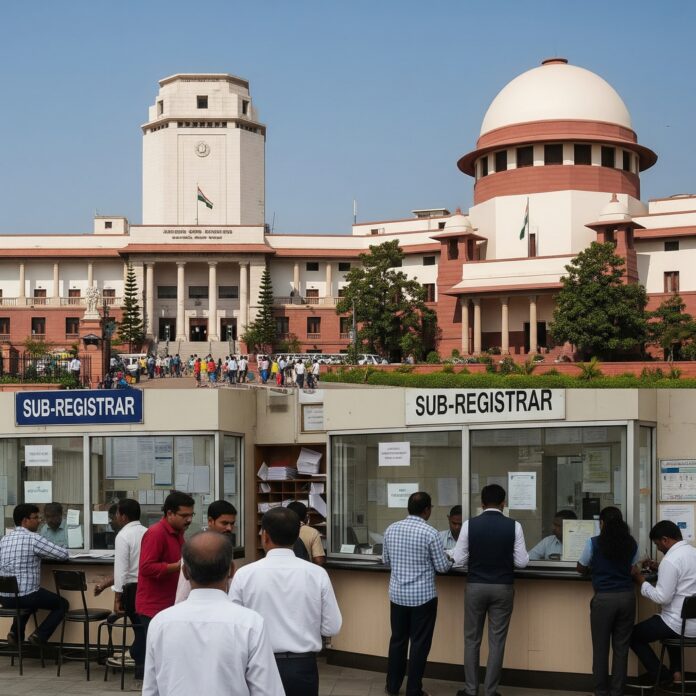BENGALURU/NEW DELHI – In a dual development highlighting efforts to streamline property transactions and address consumer grievances, Karnataka has successfully launched a new initiative for weekend property registrations, while the Reserve Bank of India (RBI) is asserting its regulatory role in the Supreme Court concerning alleged abuses of real estate subvention schemes.
Weekend Registrations Take Off in Karnataka
The Karnataka government’s novel program, allowing property registrations to proceed on weekends, commenced strongly on June 1st, the first Sunday after its introduction. More than 800 property documents were officially registered across the state on this inaugural day, generating over Rs 3 crore in revenue from stamp duty and registration fees alone.
Officials within the department of stamps and registration described the initial response as “decent” and “encouraging,” expressing confidence that participation will increase in the coming weeks. The initiative’s primary goal is to alleviate the heavy weekday congestion typically seen at sub-registrar offices and provide greater convenience for working individuals.
A department official stated that the government is exploring awareness campaigns to further popularize this new option. Weekend registration has already made the process smoother for both buyers and sellers, particularly benefiting those who previously faced difficulties visiting sub-registrar offices during the work week due to their busy schedules.
Under this revamped scheme, at least one sub-registrar office in each district is mandated to operate on the second and fourth Saturdays, as well as all Sundays of every month. P. Sunil Kumar, Inspector General of Registration and Commissioner of Stamps (IGRCS), clarified the operational adjustment: “Sub-registrar offices working on the second and fourth Saturdays and all Sundays will observe a holiday on the following Tuesday. So, the revenue collection will remain the same. Our main intention is to assist the working class rather than collecting more revenue,” Kumar explained.
Initial data indicates that approximately 834 property documents were registered statewide on the opening day, with 60 of these linked to the farmer registration and unified beneficiary information system (FRUITS). Dharwad district recorded the highest number of registrations at 140, followed by Chitradurga with 95, and Bijapur (Vijayapura) with 69. In contrast, the five stamp and registration districts within Bengaluru Urban collectively processed only 20 registrations. Karnataka encompasses 35 registration districts, including five within Bengaluru, but on June 1st, only 32 districts offered property registration services, with no registrations taking place in Kodagu, Karwar, and Shivajinagar.
RBI Addresses Subvention Scheme Fallout in Supreme Court
Separately, in a significant development for homebuyers nationwide, the Reserve Bank of India (RBI) has informed the Supreme Court that it has consistently issued guidelines to ensure the proper utilization of loan amounts by real estate developers. This declaration comes amid a Central Bureau of Investigation (CBI) probe, ordered by the Supreme Court, into an alleged “unholy nexus” between banks and real estate companies, which has been accused of harassing homebuyers.
The core of the issue lies in the prevalent “subvention scheme,” a financing model where banks disburse sanctioned loan amounts directly to builders. Under these agreements, builders are typically responsible for paying the EMIs on these loans until the flats are handed over to the homebuyers. However, this model has frequently led to consumer distress when developers fail to complete construction and subsequently default on EMI payments. Consequently, banks have initiated recovery actions against homebuyers, prompting hundreds of affected individuals to seek the Supreme Court’s intervention.
The Supreme Court provided crucial relief to these homebuyers last July, directing that no coercive action, including proceedings for cheque bounce cases, could be taken against them by banks or builders regarding EMI payments. “Coercive action” can include legal steps such as asset seizure or credit score damage.
In an affidavit filed in the apex court, the banking regulator underscored that it has “performed its duty in discharge of its statutory obligations under various statutes, including those under the BR (Banking Regulation) Act”. The RBI also highlighted that it had issued directives to banks prohibiting any form of intimidation or harassment during loan recovery from buyers.
The regulator further noted that it had taken cognizance of practices like subvention schemes as far back as 2015. At that time, guidelines were issued stipulating that the disbursal of housing loans sanctioned to individuals should be closely linked to the construction stages of the housing project, and that upfront disbursal should not be made for incomplete or under-construction housing projects.
The ongoing CBI probe underscores the judiciary’s serious concerns about transparency and accountability in the real estate and financial sectors, aiming to protect the interests of vulnerable homebuyers.

